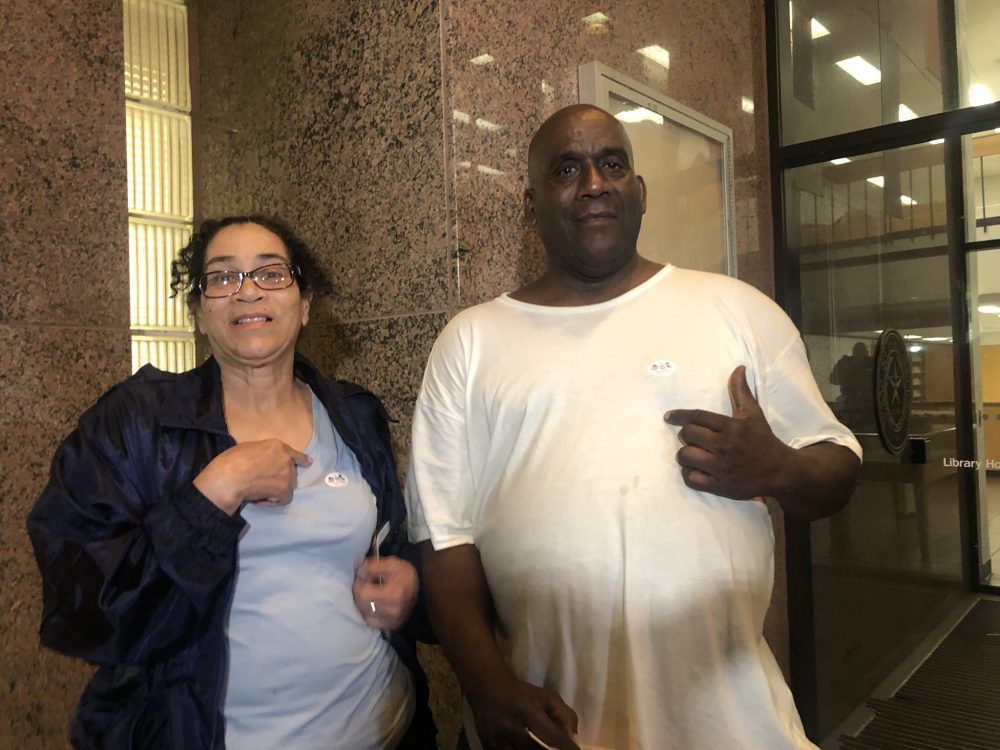
Updated 7:37 a.m. CT
When Hervis Rogers went viral on social media for being the last person in line at Texas Southern University to cast a vote at 1 a.m. on Super Tuesday, he was applauded as a tenacious, civic-minded man who worked hard to exercise his right to vote.
Now, Rogers is being prosecuted by Texas Attorney General Ken Paxton's office for allegedly voting illegally while on parole.
The arrest came just one day before the Texas Legislature convened on Thursday to begin a special session, where a controversial voting bill is on the agenda. Republicans in favor of new voting restrictions point to cases like Rogers’ as proof of an insecure system. However, there was no evidence of widespread voter fraud in the 2020 presidential election.
Rogers was arrested and sentenced to 25 years in prison for burglary and intent to commit theft in 1995. He was out on parole May 20, 2004, and his parole was set to end June 13, 2020.
Rogers was one of millions of people in America without the right to vote, because of laws in a number of states, including Texas, prohibiting formerly convicted felons from participating in elections while still on parole.
Rogers was arrested on Wednesday in the South Acres neighborhood in Houston, and he voted in Harris County, but the AG’s office is prosecuting the case in Montgomery County. Rogers is charged with two counts of illegal voting.
The arrest also comes amid Texas GOP attempts to make it more difficult to bond out of jail, including limiting the operations of charitable bail organizations — a move critics say unfairly targets poor defendants.
Rogers’ bail, set at $100,000, was paid over the weekend by the nonprofit Bail project, which helps indigent people get out of jail pretrial.
“Voting restrictions and the expansion of the cash bail system go hand in hand,” read a statement from Robin Steinberg, founder and CEO of The Bail Project. “Mr. Hervis' situation is a textbook example of how these systems intersect to undermine our fundamental rights and target minorities. In their fevered desire to suppress the turnout of people of color, the Texas Attorney General has engaged in political theatre, while using the bail system to send a targeted message of fear.”
Rogers is represented by the ACLU of Texas and Nicole DeBorde Hochglaube. Andre Segura, legal director of the ACLU of Texas, called Rogers’ release from jail “a relief.”
“He should not have been arrested and charged in the first place, and certainly should not have been forced to languish in jail on an outrageously high bail amount,” Segura wrote in a statement. “This prosecution demonstrates the danger to Texan citizens when even innocent mistakes in the voting process can be criminalized. Mr. Rogers received national praise for his commitment to casting a ballot, and we will continue to fight for justice for him and will push back against efforts to further restrict voting rights.”
Because Rogers voted before his parole was scheduled to end, he was likely ineligible to cast a ballot on Election Day, despite being registered to vote, said a spokesperson with the Harris County Attorney's Office last year.
It's not the first time such a case has occurred in Texas. In 2016, Crystal Mason, a Tarrant County mother of three, cast a vote while on federal supervised release. She maintains that she did not know about the rules. And when she arrived at the polling place, she told the ACLU that her name wasn't on the list of registered voters, but she was offered a provisional ballot, which she filled out.
Six months later, she was arrested.
Texas Attorney General Ken Paxton has made prosecuting alleged cases of voter fraud a core mission of his office. Data released by the AG's office reveals more than 130 people were prosecuted between 2005 and 2018.
But critics say the law in part targets people like Rogers and Mason, who've already served time in prison and who may be unaware of the rules prohibiting them from participating in elections.
Those critics also say these laws disproportionately impact people of color. There were almost 160,000 people in Texas prisons in 2016, according to research from the Sentencing Project, a criminal justice reform group. More than 490,000 Texans were on probation or parole in 2017, and Black Texans were four times more likely to be incarcerated than white Texans, the group said.
Under a bill approved in 2007 by both the Texas House and Texas Senate, the Texas Department of Criminal Justice would have been required to notify people released from custody about their eligibility to vote. However, former Gov. Rick Perry vetoed that bill.
A similar bill filed this week by State Rep. John Bucy would require the state to give people convicted of felonies more information about their eligibility to vote.
Nicole D. Porter, director of advocacy with the Sentencing Project, said Hervis Rogers' case illustrates the need for the state to give people proper notification of their rights.
"It seems that this case in particular is an example of Texas officials using their authority to disappear Black residents under a pretext to gain political points with their cronies in their political party in Texas and nationally," Porter said. "What Paxton, Abbott and others seem to forget is that this is a person who they're attempting to disappear."
A spokesperson for Paxton said his office does not comment on active investigations.

 72 °F
72 °F